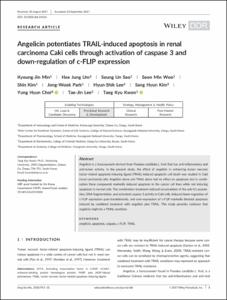Angelicin potentiates TRAIL-induced apoptosis in renal carcinoma Caki cells through activation of caspase 3 and down-regulation of c-FLIP expression
- Keimyung Author(s)
- Kim, Shin; Kwon, Taeg Kyu; Park, Jong Wook
- Department
- Dept. of Immunology (면역학)
- Journal Title
- Drug Development Research
- Issued Date
- 2018
- Volume
- 79
- Issue
- 1
- Abstract
- Preclinical Research & Development Angelicin is a furocoumarin derived from Psoralea corylifolia L. fruit that has anti-inflammatory and anti-tumor activity. In the present study, the effect of angelicin in enhancing tumor necrosis factor-related apoptosis-inducing ligand (TRAIL)-induced apoptotic cell death was studied in Caki (renal carcinoma) cells. Angelicin alone and TRAIL alone had no effect on apoptosis, but in combination these compounds markedly induced apoptosis in the cancer cell lines while not inducing apoptosis in normal cells. The combination treatment induced accumulation of the sub-G1 population, DNA fragmentation, and activated caspase 3 activity in Caki cells, induced down-regulation of c-FLIP expression post-translationally, and over-expression of c-FLIP markedly blocked apoptosis induced by combined treatment with angelicin plus TRAIL. This study provides evidence that angelicin might be a TRAIL sensitizer.
- Publisher
- School of Medicine (의과대학)
- Citation
- Kyoung-Jin Min et al. (2018). Angelicin potentiates TRAIL-induced apoptosis in renal carcinoma Caki cells through activation of caspase 3 and down-regulation of c-FLIP expression. Drug Development Research, 79(1), 3–10. doi: 10.1002/ddr.21414
- Type
- Article
- ISSN
- 0272-4391
- Appears in Collections:
- 1. School of Medicine (의과대학) > Dept. of Immunology (면역학)
- 파일 목록
-
-
Download
 oak-2018-0110.pdf
기타 데이터 / 1.14 MB / Adobe PDF
oak-2018-0110.pdf
기타 데이터 / 1.14 MB / Adobe PDF
-
Items in Repository are protected by copyright, with all rights reserved, unless otherwise indicated.